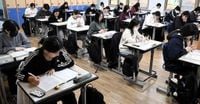South Korea is taking a bold leap to address a problem that has been gnawing at its youth for years: smartphone addiction. On August 27, 2025, the country’s National Assembly passed a sweeping law that will ban the use of mobile phones and smart devices during class hours in every school nationwide, according to reporting by Tuoi Tre and dbnd.vn. The measure, which takes effect with the new school year in March 2026, marks South Korea as one of the few nations to implement such a policy at the national level, rather than leaving it to individual schools.
The law sailed through parliament with 115 votes in favor out of 163 lawmakers present, demonstrating a rare moment of broad political consensus. The urgency behind the measure is clear: nearly a quarter of South Korea’s population—over 12 million people—are considered overly dependent on their phones, according to a 2024 government survey cited by dbnd.vn. Among those aged 10 to 19, the figure jumps to a staggering 43%. And it’s not just about screen time. More than a third of teenagers admit struggling to control the amount of time they spend on social media platforms.
What’s driving this dependency? Lawmakers, parents, and teachers point to the deep integration of digital devices into daily life. South Korea boasts some of the world’s highest rates of digital connectivity—99% of the population uses the internet, and 98% own a smartphone, as highlighted by a Pew Research Center assessment. For many students, their phones are not just tools; they’re lifelines to friends, entertainment, and sometimes even education. Yet, as legislator Cho Jung-hun, the law’s sponsor, put it, “There is clear scientific and medical evidence that smartphone addiction causes serious harm to students’ brain development and emotional health.” He noted that the impact extends beyond grades, affecting sleep, mental well-being, and the very fabric of social interaction among youth.
So what exactly does the new law entail? During class hours, students will be prohibited from using mobile phones and smart devices. Teachers, however, have the authority to expand these restrictions to the entire school campus if they see fit. There are some exceptions: students with disabilities who require assistive devices, those using digital tools for educational purposes, or in emergency situations. Schools are also tasked with educating students on responsible technology use, aiming to foster healthier digital habits in the long run.
The Korean Teachers’ Federation (KFTA) has welcomed the legislation, arguing that it provides a much-needed legal backbone for maintaining classroom discipline. An internal KFTA survey found that nearly 70% of teachers have faced situations where students lost control when phone use was restricted—sometimes leading to verbal abuse or even physical confrontations. “The law gives us a firmer ground to stand on,” one federation spokesperson remarked, echoing the sentiment of many educators who have felt powerless to enforce existing, piecemeal school policies.
Parents, too, have largely thrown their support behind the ban. Choi Eun-young, whose 14-year-old daughter attends school in Seoul, told dbnd.vn, “When they go to school, children need to learn, build friendships, and participate in group activities. But even when talking to friends, they quickly return to their phones. This clearly affects their learning and personal development.”
Others, like Kim Sun, a mother of two elementary school students, worry about more than just academic distraction. She highlighted the dangers of cyberbullying, noting, “Students can hurl unimaginable insults at each other through social media. The consequences are unpredictable.” The hope among many parents is that the ban will not only boost focus in the classroom but also help curb the darker side of digital life.
Still, not everyone is convinced the law is a silver bullet. Some teachers and union members have expressed concerns that the measure could infringe on students’ rights to access their phones, especially in an age where digital literacy is crucial. Others argue that simply banning devices during school hours addresses only the symptoms, not the root causes, of the problem. “In reality, students don’t have many opportunities to meet friends outside of extra classes, so phones become a vital connection tool,” said Cho Young-sun, a high school teacher. “The core issue is the intense academic pressure in South Korea, not just the phone itself.”
Students themselves are divided. Seo Min-joon, an 18-year-old high school student, offered a candid assessment: “Banning phones during class won’t change much. We can still use them on the way to school or at night.” This skepticism is echoed in Ministry of Education data, which found that 22% of students feel anxious if they can’t access their social media accounts, and around 37% report that social media affects their daily lives.
South Korea’s move comes in the wake of previous, school-level restrictions on smartphone use, but this is the first time the policy has been codified on a national scale. The law was prompted by growing concern over the impact of social media addiction on youth health and academic performance. As Tuoi Tre reported, many young people stay up late into the night scrolling through Instagram and other platforms, with negative consequences for both their physical and mental well-being.
Despite the strong support from many quarters, the law’s effectiveness remains to be seen. Some critics argue that students will simply find ways to circumvent the ban, or that it will push problematic phone use into other parts of the day. Others stress the need for more comprehensive solutions, such as teaching responsible technology use and addressing the broader pressures that drive students to seek solace in their devices in the first place.
For now, South Korea stands as a test case for how far a nation can—and should—go to curb the influence of smartphones in the lives of its youngest citizens. The law is a bold step, but as many observers have noted, it may be only the beginning of a much longer journey toward healthier digital habits and a more balanced approach to technology in education.
As the clock ticks toward March 2026, schools, families, and policymakers across South Korea will be watching closely to see whether this ambitious experiment can truly make a difference—or if, like so many notifications on a locked screen, the problem will simply find another way to demand attention.




